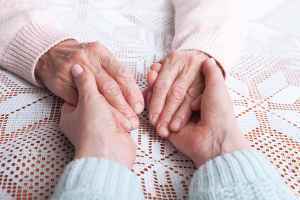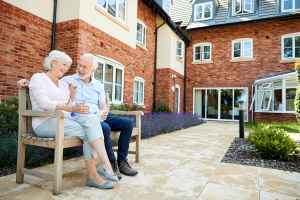Nursing Homes in Pennsylvania
With almost 13 million residents and a significant percentage aged 65 and above — 18.7%, which is more than 3% above the national average of 16.5% — Pennsylvania is an attractive location in the Mid-Atlantic region for seniors. Nine cities and counties in the state are members of the AARP Network of Age Friendly States and Communities, including Allegheny, Lehigh and Westchester counties and the cities of Philadelphia and Pittsburgh. Pennsylvania offers many amenities for seniors, including a high number of Medicare-registered doctors, world-class hospital facilities in major centers and a cost of living almost eight points below the national average.
Seniors and their families have a wide choice of nursing home facilities in Pennsylvania, which had 684 long-term care facilities in operation as of 2019. These skilled nursing facilities can provide care for seniors with various medical needs. In this guide, we’ll explore the cost of care in Pennsylvania nursing homes, the regulations that protect seniors who reside in long-term care facilities and government programs that help seniors and their families pay for nursing home care.
SeniorAdvice's Guide to Nursing Home Care in Pennsylvania
The SeniorScore is an index of a state or community’s suitability for seniors based on 100 data points organized into four categories: Health & Safety, Recreation & Leisure, Finances and General Quality of Life. Pennsylvania has an overall SeniorScore of 73, which is one point above the national average of 72.
The state earned its highest score of 70 is in Health & Safety. This is based on the high number of Medicare-registered doctors, hospitals and senior living facilities in the state. Additionally, Pennsylvanians have an average life span of 78.5 years which compares favorably with the national average of 78.6.
The Keystone State’s next best score was a 69 in Recreation & Leisure. This is partially due to the high number of seniors in the state, which results in numerous amenities for seniors statewide. Pennsylvania has many federal, state and municipal parks and there are over 5,800 churches, as well as many synagogues and mosques throughout the state.
The state received its lowest score in General Quality of Life with a 59. Pennsylvania's weather and climate can be harsh at times, and the state receives an extra 10 inches of snow and six inches of rain each year compared to the national averages. While winters are cold, with an average temperature of 19 degrees, summers are pleasant with an average high of 83. Pennsylvania has a comfort index of seven out of 10, which matches the national average.
Top Nursing Care in Pennsylvania
Situated in the Hawthorne area of Philadelphia, Pennsylvania, Powerback Rehabilitation is a 150 unit nursing home facility. The encompassing area has a dense population, with roughly 36,000 poeple living in the zip code of 19146. With an average ...
Located in the Penn Wynne area of Wynnewood, Pennsylvania, Saunders House is a 180 unit senior housing facility. With a median per-family income of $103,988, the community is in a mostly upper class area. It has a medium-density ...
Located at 3485 Davisville Rd in Hatboro, Pennsylvania, Powerback Rehabilitation, Davisville Road is a 109 room skilled nursing facility. With roughly 22,000 residents in the 19040 zip code, the neighboring area is densely populated. It is a generally ...
ManorCare Health Services-Lansdale is a 170 room nursing home facility. It is located at 640 Bethlehem Pike in Montgomeryville, Pennsylvania. The facility is in a mostly well-to-do area, with an average household income of $77,772. With approximately ...
Old Orchard Health Care Center is a 180 bed skilled nursing facility located in Easton, Pennsylvania. The encompassing area has a dense population, with roughly 27,000 people residing in the 18045 zip code. It is a primarily middle ...
Crestview Center is a 180 bed senior care community situated nearby the Village Shires area of Langhorne, Pennsylvania. The community is in a predominantly upper class area, with a median household income of $82,821. It is densely populated, ...
St. Monica Center For Rehabilitation and Healthcare is located within the Whitman area of Philadelphia, Pennsylvania. It is a 180 unit nursing home facility. The facility is in a largely middle class area, with an average family income ...
Tucker House Nursing and Rehabilitation Center is situated within the West Poplar area of Philadelphia, Pennsylvania. It is a 180 room nursing care facility. The encompassing area has a medium-density population, with about 14,000 residents in the 19123 ...
Located within the Mount Lebanon area of Pittsburgh, Pennsylvania, Concordia of The South Hills is a 46 room senior community. The surrounding area has an average population density, with approximately 14,000 residents in the zip code of 15243. ...
Buckingham Valley Rehabilitation and Nursing Center is a 130 unit nursing care facility. It is located at 820 Durham Road PO Box 447 in Buckingham, Pennsylvania. The facility is in a primarily affluent area, with a ...
Located in the Burnholme neighborhood of Elkins Park, Pennsylvania, Elkins Crest Health and Rehabilitation Center is a 150 unit skilled nursing facility. With roughly 20,000 residents in the 19027 zip code, the surrounding area has a medium-density population. ...
The Meadows at Shannondell is a 60 unit senior housing facility. It is located at 6000 Shannondell Dr in Audubon, Pennsylvania. The community is in a largely middle income area, with an average family income of $74,361. ...
St. John Neumann Centrr For Rehab and Healthcare is located in the Northeast Airport neighborhood of Philadelphia, Pennsylvania. It is a 226 room nursing facility. With roughly 34,000 people residing in the zip code of 19116, the neighboring ...
Brinton Manor is a 92 bed senior housing community located in Glen Mills, Pennsylvania. The community is in a largely affluent area, with a median household income of $99,375. With roughly 19,000 poeple living in the 19342 zip ...
Langhorne Gardens Rehabilitation and Nursing Center is a 120 room skilled nursing facility. It is located at 350 Manor Ave in Langhorne, Pennsylvania. The neighboring area has a dense population, with about 36,000 residents in the 19047 zip ...
Bryn Mawr Terrace is a 120 bed senior housing facility. It is located at 773 East Haverford Rd in Bryn Mawr, Pennsylvania. The encompassing area is heavily populated, with around 22,000 people residing in the zip code of ...
St. Martha Center For Rehabilitation and Healthcare is located at 470 Manor Ave in Downingtown, Pennsylvania. It is a 120 unit nursing care facility. With about 48,000 people residing in the 19335 zip code, the encompassing area is ...
Moravian Village of Bethlehem is a 118 unit senior housing community situated in Bethlehem, Pennsylvania. The facility is in a mostly middle class area, with a median per-household income of $46,494. It has a dense population, with roughly ...
Located at 2029 Westgate Dr in Bethlehem, Pennsylvania, ManorCare Health Services-Bethlehem is a 217 unit nursing care facility. The community is in a largely middle income area, with a median per-household income of $64,939. With roughly 39,000 people ...
Majestic Oaks Rehabilitation and Nursing Center is a 180 bed nursing home facility situated in Warminster, Pennsylvania. The encompassing area is heavily populated, with about 42,000 people residing in the zip code of 18974. It is a predominantly ...
The Cost of Nursing Home Care in Pennsylvania
Pennsylvania’s average monthly cost of $10,038 for nursing home care is almost $2,300 above the national average of $7,756. However, it's about the same amount less expensive than in New York, where the average is $12,319 per month. It's also about $1,200 per month lower than the New Jersey average of $11,254 and about $150 cheaper than the $10,190 median in Maryland. In contrast, the average cost in Ohio is substantially lower $7,148 per month.
- Pennsylvania: $10,038
- United States: $7,756
- New York: $12,319
- New Jersey: $11,254
- Maryland: $10,190
- Ohio: $7,148
The Cost of Nursing Home Care in Pennsylvania’s Top Cities
Costs for nursing home care vary significantly in Pennsylvania's top cities. Allentown has one of the highest rates at $12,471 per month, followed by Reading at $11,724. Costs in Philadelphia average $11,285, whereas the median in Lancaster is $11,224. In Harrisburg, seniors pay an average of $10,311, while in Scranton and Pittsburgh, this level of care costs $9,885 and $9,125, respectively.
- Philadelphia: $11,285
- Pittsburg: $9,125
- Allentown: $12,471
- Reading: $11,724
- Scranton: $9,885
- Lancaster: $11,224
- Harrisburg: $10,311
Senior Care Cost Comparison in Pennsylvania
Nursing home care is the most expensive senior care option in Pennsylvania. It’s almost $6,100 more than the cost of assisted living ($3,995), and over $5,000 more than the cost of memory care received in an assisted living setting ($4,994). In-home and home health care services both cost $4,576 per month. Adult day care averages $1,517 per month, which is the least expensive type of senior care in Pennsylvania and over $8,500 less costly than nursing home care.
- Memory Care: $4,994
- Assisted Living: $3,955
- In-Home Care: $4,576
- Home Health Care: $4,576
- Adult Day Care: $1,517
- Nursing Home Care: $10,038
Financial Assistance for Nursing Home Care in Pennsylvania
As you can see above, Nursing Home Care is often the most expensive senior care option – sometimes even 2-3 times the cost of other types of senior living. The primary reason for this is the 24/7 skilled nursing and other medical services that are provided. Thankfully, most people aren't forced to pay for skilled nursing care entirely out-of-pocket. Rather, many qualify for financial assistance programs to help cover the cost of nursing care.
Medicaid is the most comprehensive financial assistance program – but, not all seniors are eligible for Medicaid. And because each state operates its own Medicaid program within federal guidelines, eligibility and benefits vary from state to state. Below, we provide more information on Medicaid in Pennsylvania.
Medicaid in Pennsylvania
Medicaid, known as Medical Assistance in Pennsylvania, provides health care coverage to low-income Pennsylvanians and their children. As of 2018, 2.8 million residents of the state are covered by the program including about two-thirds of nursing home residents. While Medical Assistance is available to anyone in the state if they meet eligibility requirements, services for the elderly and those with disabilities account for 78% of Medicaid expenditures. Currently, there are about 80,000 adults residing in nursing homes in Pennsylvania.
Medicaid Eligibility in Pennsylvania
To be eligible for Medical Assistance for long-term care, Pennsylvania seniors aged 65 and over must meet certain financial and medical needs requirements. These include:
- Having an income at or below 300% of the federal benefit rate. The sources of income used in determining this figure include wages, Social Security and pensions. Supplemental Security Income isn't counted.
- Having resources/assets valued at no more than $2,000 for an individual and $3,000 for a couple. Personal property such as a primary residence and its contents and one motor vehicle aren't counted toward this total.
- Being a U.S. citizen, legal refugee or legal alien and a resident of Pennsylvania.
In Pennsylvania, applications for Medical Assistance/Medicaid are handled by the Department of Human Services. A staff member of a local Community Assistance Office will determine which members of an applicant's household are eligible for Medical Assistance based on their relationship and care needs. All eligible seniors receive health care coverage and benefits for nursing home care.
Seniors or their family members can apply for Medical Assistance or other benefits using the state’s COMPASS website. Alternatively, they can call the Consumer Services Center at 866-550-4355, or they can apply in person at their local County Assistance Office.
Additional Financial Assistance Options
- Medicare: For the first 20 days in a skilled nursing facility, Medicare will cover the entire cost of care, and a portion of the costs up until day 100. After 100 days, Medicare won't cover any of the costs. Importantly, seniors must also have a "qualifying hospital stay" that lasts 3 days prior to their admission to a nursing home in order to qualify for Medicare coverage.
- Aid and Attendance: Aid and Attendance may be available to veterans who receive a VA pension. This benefit is a monthly cash allowance that veterans receive in addition to their standard pension amount. It is intended for veterans in need of long-term care services and may be used to pay for skilled nursing care.
- Reverse Mortgages: For those who own a home, reverse mortgages are loans that one can take out against the value of their home, essentially converting some of the home's equity into cash. It's often a good fit for married couples when only one partner needs nursing care, as the other residents of the home may continue living there. Keep in mind that reverse mortgage loans do need to be repaid (with interest), typically within 12 months of receiving the loan.
- Long-Term Care Insurance: For seniors who already have long-term care insurance, the cost of skilled nursing care may be covered. Most policies cover at least a portion of the costs, but it depends on the specific policy terms. It's important to note that older adults who are already in need of skilled nursing care will not be eligible to sign up for a long-term care insurance policy.
Pennsylvania Nursing Home Care Rules and Regulations
The Department of Health regulates licensed nursing homes and long-term care facilities in Pennsylvania. It also maintains the state’s Nurse Aide Registry, including enrolling and testing nursing aides and maintaining a directory of resources. The rules and regulations that nursing homes in Pennsylvania must follow include:
Scope of Care | Nursing facilities in Pennsylvania are required to provide 24-hour medical care. New admissions must be approved by either a physician or a registered nurse. To ensure adequate care and the mental, physical and emotional well-being of residents, facilities must employ appropriate personnel, including a licensed administrator, registered nurses, nurses aides and a full-time, part-time or consulting physician and pharmacy service. |
Care Planning | A written care plan needs to be created by a physician or a staff registered nurse within 14 days of a resident's admission to a facility. A reassessment of the plan must be done annually and completed by the anniversary of the last assessment. The plan should be reassessed if the needs or condition of the resident changes. A resident can request to see their care plan at any time. |
Pharmacy Services | All nursing homes that have been Medicaid-certified must provide emergency and routine medication required by residents. Only a licensed physician can prescribe medication and only a licensed pharmacist can provide it. Medications and biologicals can only be administered by a an individual licensed to do this task, such as a registered nurse. Residents may purchase their prescriptions from the pharmacy of their choice. A nursing facility must ensure that its pharmacist or pharmacist consultant receives a monthly medication profile for every current resident. |
Staff Screening | The Department of Health maintains a registry of certified nurse aides. A nurse aide who's not in good standing on the registry can’t be employed in any facility that receives Medicaid funding. Nursing facilities are also required to conduct a criminal background check on all employees involved in the direct care of residents. |
Staff Training | A nursing facility must carry out an ongoing educational program designed to develop and improve the skills of its personnel. Administrators are required to complete 24 hours of job-related training each year. Registered nurses are required to complete 30 hours of continuing education over a two-year period. |
Medicaid Coverage | In Pennsylvania, the state Medicaid program, Medical Assistance, provides financial assistance for eligible seniors to cover the cost of nursing home care. To qualify for this assistance, an individual must meet the program's financial eligibility guidelines and complete a medical assessment to verify they require a nursing home level of care. |
Reporting Abuse | The Pennsylvania Long-Term Care Ombudsman program investigates reports of abuse and neglect that occur in long-term care facilities, including nursing homes. A senior resident, family member or visitor who has a concern can contact the Long-Term Care Ombudsman’s main office at 717-783-8975 to file a report. |
Free Nursing Home Resources in Pennsylvania
Pennsylvania Health Care Association
The Pennsylvania Health Care Association (PHCA) represents over 400 of the state's long-term care providers and their residents. The Association advocates with community and state lawmakers on every aspect of long-term care in Pennsylvania with the goal of promoting resident-centered, high-quality care.
Pennsylvania Health Law Project
The Pennsylvania Health Law Project works with low-income individuals, including seniors and persons with disabilities, to help them access publicly funded healthcare services and ensure their rights are protected. The project can assist with issues related to managed care, Medicaid eligibility, access to Medicaid services and long-term services and supports.
Pennsylvania Agencies
Pennsylvania Department of Human Services' Office of Long-Term Care Services
Address: 625 Forster St., Harrisburg, PA 17120
Phone Number: (800) 692-7462
Website: https://www.dhs.pa.gov/Services/Disabilities-Aging/Pages/Long-Term-Care-Services.aspx
The Office of Long-Term Care Services provides residents of Pennsylvania with a variety of resources and information about how to plan for their long-term care needs. Some of these resources include a Long-Term Care Handbook, a guide to Medical Assistance and Payment of Long-Term Care Services and an overview of waivers that may help offset the cost of long-term care for eligible seniors and how to apply for them.
Pennsylvania Long-Term Care Ombudsman Program
Address: 625 Forster St., Harrisburg, PA 17120
Phone Number: (717) 783-8975
Website: https://www.aging.pa.gov/aging-services/Pages/Ombudsman.aspx
The Office of the Long-Term Care Ombudsman relies on trained volunteers to investigate reports of abuse and neglect at long-term care facilities in Pennsylvania. Its ombudsmen, who work through local Area Agency on Aging offices, act as resident advocates to resolve complaints about care and living conditions and educate seniors about their rights.
Pennsylvania Department of Insurance
Address: 1326 Strawberry Square, Harrisburg, PA 17120
Phone Number: (877) 881-6388
website: https://www.insurance.pa.gov/Coverage/Pages/LongTermCare.aspx
The Pennsylvania Department of Insurance provides seniors and their families with information on long-term care insurance policies that can help cover the cost of services in a nursing facility that aren't paid for by Medicaid. This also includes long-term care insurance for seniors who are aging in place or in other long-term care settings.
Area Agencies on Aging in Pennsylvania
AAAs, created by an act of Congress in the 70s, provide a wide variety of programs and resources for seniors in their local communities. In Pennsylvania, there are 52 Area Agency on Aging offices serving seniors in the state's 57 counties. The services available may include level-of-care assessments, delivery of nutritious meals, transportation to medical appointments, visits to isolated seniors and consultations for seniors and their family members about their long-term care options. Pennsylvania AAA offices also work with other local community organizations to provide services needed by seniors.
Veteran Affairs Office in Pennsylvania
The mission of the Pennsylvania Office for Veterans Affairs Is to help all veterans, their families or their survivors gain access to benefits earned through their military service. This includes access to the six veterans’ homes located throughout the state. Senior veterans can also access a variety of other benefits including assistance with obtaining health care services and applying for disability compensation, pensions and supplements such as Aid and Attendance benefits. Veterans can contact their local community director for more information on how to obtain assistance in their area.
Social Security Offices in Pennsylvania
The Social Security Administration offers various programs and services for seniors and disabled adults. These include retirement benefits, Social Security disability benefits and survivors benefits available upon the death of a spouse. Low-income seniors who are eligible for Supplemental Security Income may also qualify for financial assistance to help pay for room and board in long-term care facilities. Seniors can contact or visit their nearest Social Security office to learn about their available benefits and receive help with applications.






















 Your Information is Processing
Your Information is Processing